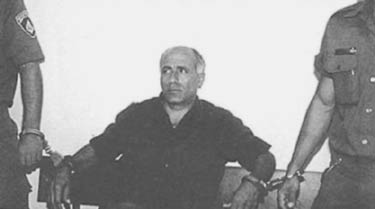![]()
Write us!
socialistviewpoint@pacbell.net
Israel Seeks to Extend Silencing of Anti-Nuke Whistle Blower
By Eric Silver
 |
|
Mordechai Vanunu handcuffed.
|
Mordechai Vanunu, whose imprisonment for spilling Israel’s nuclear weapons secrets has made him an international cause célèbre, opened a battle this week against government plans to restrict his freedom after he is released from 18 years’ solitary confinement on 21 April.
In a defiant statement, issued through his brother Meir, he boasted that he had won. “In the end the locks will be open,” he said. “They didn’t break me or drive me mad after all those years of isolation.” He wants to move to the United States.
Ariel Sharon decided on Tuesday that Mr. Vanunu should “be subjected to appropriate supervisory measures in order to prevent him from perpetrating additional security offenses.” Among the measures being considered are a ban on leaving the country, monitoring his phone calls and supervising whom he meets and what they talk about.
“They say I have additional secrets,” Mr. Vanunu said, “but that is a lie, an excuse, a cover-up. All that was known to me has been published. Anything I can say will be a repetition.”
Although he denied any intention of fighting the state, he insisted on his right “to express my position against nuclear weapons, in the world or in Israel.” That is what worries ministers. They accept that his knowledge of the Dimona reactor, where he worked as a technician for nine years, is long out of date. But they fear that any campaign he inspires will threaten Israel’s traditional policy of “nuclear ambiguity.”
They prefer to say “Israel will not be the first to introduce nuclear weapons into the Middle East” than to rattle sabers. That way, they claim, the Arab states are deterred from aggression, but they are not provoked into a nuclear arms race.
A senior security official said: “He may not have any new secrets, but it is sufficient that he will mount a campaign. People around the world will use him as a banner. There is no reason for us to allow this kind of provocation when we can stop it.”
Dan Yakir, legal counsel for the Association for Civil Rights in Israel, said that they would fight any new restrictions. “Having served a full term, he will be a citizen with all the basic rights like anyone else. If he breaks the law, they can put him on trial.”
Mr. Vanunu was lured into a honey trap in Leicester Square in 1986 by “Cindy,” a blond, American-born Mossad agent. She enticed him to Rome, where the secret service abducted him home to stand trial. A court in Jerusalem sentenced him to 18 years for treason.
His brother, Meir, said yesterday that Mr. Vanunu, aged 51, was in “relatively good” fettle, although he showed the effects of his incarceration. The doors of his narrow cell are open 12 hours a day and he is free to go out into a small yard.
Israel and the bomb
Israel’s official line is still that it “will not be the first to introduce nuclear weapons into the Middle East,” although the late defense minister Moshe Dayan used to add slyly that it wouldn’t be the second either. They call it “constructive ambiguity.”
Israel, one of the world’s top five nuclear powers, wants the Arabs to know that they have the bomb, but they don’t want to provoke a nuclear arms race.
As long ago as 1974, the then president, Ephraim Katzir, let the cat out of the bag. “It has always been our intention to develop the nuclear potential,” he announced. “We now have that potential.”
Within a year the CIA was talking about a stockpile of 10 bombs. A decade later, Mordechai Vanunu, a technician who had worked for nine years at the Dimona nuclear installation, provided a first-hand insider’s account. Websites display aerial photographs of the reactor, as well Vanunu’s photographs and reconstructions.
Estimates of how many bombs Israel has range from 100 to 400. Vanunu said it could produce 88 pounds of plutonium a year.
Israel is equally coy about its delivery capability, but its Jericho II missile has a range of 930 miles and can carry about 620 pounds.
—The Independent (UK), February 27, 2004
Write us
socialistviewpoint@pacbell.net